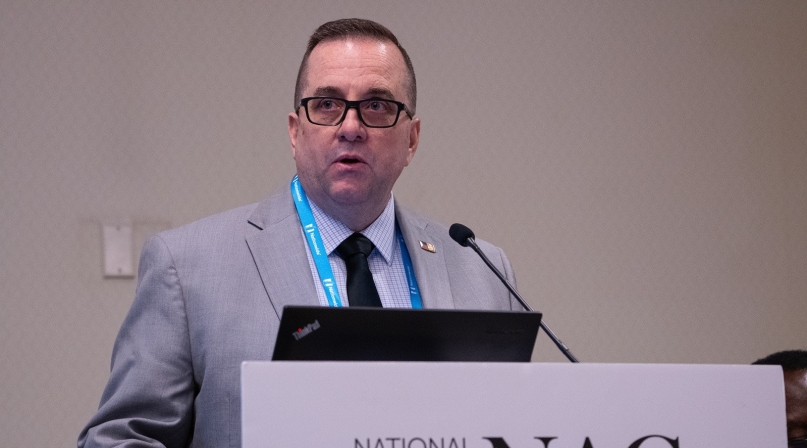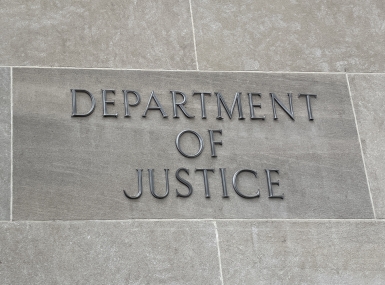Biden administration is ‘engaged in largest anti-smuggling campaign in history,’ official says

Key Takeaways
The Biden administration is scaling up its anti-smuggling operations and expanding cooperation and support for counties and cities and non-profits on the border.
In fact, the Department of Homeland Security “is engaged in the largest anti-smuggling campaign in history,” said Sean McGoffin, senior coordinating official for the Southwest Border Coordination Center, U.S. Department of Homeland Security.
One of the problems the administration is combatting? Misinformation doled out to people trying to enter the United States both legally and illegally, often by smugglers, said McGoffin, who spoke to members of NACo’s Justice and Public Safety Committee Saturday afternoon.
Learn more
“When people are being smuggled — and there are smugglers on both sides of the border — they are treated like a commodity, not a human being,” he noted. Misinformation provided by smugglers gives migrants false hope. “They were telling Venezuelans that buses will be available to take them to Canada.”
“It’s really about educating these individuals’ [who want to come to the United States], he said. “They’re being told fabrications.”
The Biden administration is taking on smuggler misinformation, with the State Department expanding media outreach to be sure that accurate information is reaching migrants.
Trying to cross the border often ends with deadly results. Last year, at least 853 migrants died trying to cross from Mexico to the United States, according to a report by CBS News.
“On a regular basis, our job turns into rescues and that’s what we do,” McGoffin said. “Saving that human life is important. The people we encounter are deserving of that respect.”
The United States has seen an uptick in border rescues to 22,014 in 2022, after totaling 12,857 in 2021 and 5,336 in 2020.
One tool in the Customer and Border Protection toolbox is CPBOne, a mobile app used to streamline lawful entry into the country, McGoffin said. The app guides users to services based on their needs, such as reporting their arrival, completing documents or making appointments for CBP services. The app is designed to streamline their travel by providing information before or upon their arrival or departure. It also increases transparency for CPB stakeholders through online access to service requests, live status updates and direct chat capabilities.
The U.S. Customs and Border Protection is guided in its mission by six pillars, McGoffin said. (Quotes explaining more about each pillar are from an executive summary issued by DHS Sec. Alejandro Mayorkas.)
-
Surging resources: “We are surging resources, including personnel, transportation, medical support and facilities to support border operations.”
-
Increasing efficiency to reduce strain on the border: “We are increasing CPB processing efficiency and moving with deliberate speed to mitigate potential overcrowding at Border Patrol stations and to alleviate the burden on the surrounding border communities.”
-
Employing an aggressive consequence regime: “We are administering consequences for unlawful entry, including removal, detention and prosecution.”
-
Bolstering the capacity of non-profits: “We are bolstering the capacity of non-governmental organizations (NGOs) to receive noncitizens after they have been processed by CBP and are awaiting the results of their immigration removal proceedings. And, we are ensuring appropriate coordination with and support for state, local and community leaders to help mitigate increased impacts to their communities.”
-
Go after cartels and smugglers: “We are targeting and disrupting the transnational criminal organizations and smugglers who take advantage of and profit from vulnerable migrants, and who seek to traffic drugs into our country.”
-
Work with regional partners. “We are deterring irregular migration south of our border, in partnership with the Department of State, other federal agencies, and nations throughout the Western Hemisphere, to ensure that we are sharing the responsibility throughout the region.”
Attachments
Related News

DOJ terminates justice and public safety-focused grants
On April 22, the U.S. Department of Justice’s largest grant-making arm—the Office of Justice Programs—abruptly cancelled hundreds of grants awarded to county governments and other local jurisdictions and organizations. Approximately 365 grants have been identified for termination, which were estimated to be valued at $811 million at the time of awarding; it is unclear how much funding remained at the time of termination.

County Countdown – April 21, 2025
Every other week, NACo's County Countdown reviews top federal policy advocacy items with an eye towards counties and the intergovernmental partnership. This week features the ARPA reporting deadline, a budget reconciliation update and more

U.S. House reintroduces legislation to address the Medicaid Inmate Exclusion Policy
Two bipartisan bills aimed at addressing the Medicaid Inmate Exclusion Policy (MIEP) were recently reintroduced in the U.S. House of Representatives.
